
|

|
Forum Index : Solar : Conductivity of 0.8mm Copper plate - How Wide for 60Amps?
| Author | Message | ||||
| Technophiliac Regular Member Joined: 18/12/2020 Location: New ZealandPosts: 92 |
Hi Guys. I want to run a short section of high current through an aluminium double door between the door and the door rubber - to save drilling a temporary hole in the wall to route the otherwise thick cables. Its temporary, at this stage, so I want a temporary yet safe and reliable solution. I need to figure out how wide the current carrying capacity of the 0.8mm thick copper plate is (That I have ~ 15cm wide), but am I am unsure on that bit. For example how much current can be carried in say a piece of 0.8mm copper plate 5cm wide? I figure I can keep it thin and insulated by moulding a single layer of fibre glass each side - and also use that to hold the conductors together side by side as a single unit. That would better than a PCB with thinner copper plate and an unnecessarily thicker board. I would solder the conductors onto each side along the full width at each end. The trick to make this work is to fold a 90 degree angle so it sits in the door "gap" and protrudes at the bottom for the soldering the thick copper wire onto. Potential uses include for solar (single phase) and wind turbine (3 phase). Anyone any ideas how to calculate the safe current capacity? Davo, Wellington. You can have it perfect, on time, and at the best price. Choose any two. |
||||
| Warpspeed Guru Joined: 09/08/2007 Location: AustraliaPosts: 4406 |
Well 5Cm x 0.8mm equals 40 square millimetres of cross sectional area. There are two very different ways of rating electrical cables for current, depending on what is most important in the circumstances, voltage drop over distance, and temperature rise. Safe temperature rise also varies a lot depending on the type of insulation, and its ability to lose heat into the environment. So its not really a question that has a single definite answer. As these metal strips will be fully exposed, the safe current might be at the higher end of typical commercial figures for insulated cables. You can find many different ratings for cables on the internet, but 40mm squared is getting rather large. Here is an example found at random by Google: https://www.sab-cable.com/cables-wires-harnessing-temperature-measurement/technical-data/cables-and-wires/instructions-for-the-safe-application-of-cables/boundary-conditions/calculate-wire-cross-section-current-carrying-capacity-table.html Something around 180 amps continuous should be fine. Cheers, Tony. |
||||
| Technophiliac Regular Member Joined: 18/12/2020 Location: New ZealandPosts: 92 |
Appreciate the helpful and prompt response, thanks Tony. If I read you correctly you are saying 5cm wide of 0.8mm copper plate = 40 mm sq ~ 180 Amp continuous capacity. So If I over spec'ed it for say 100Amps = say 2cm x 0.8 mm = 16 mm Sq = Fine for continuous 98A. Using your helpful URL As the plates will be side by side I am guessing the number of charged conductors is 1 as they are not entwined, or in the case of plate sandwiched together, in which case the lower 2-3 conductor spec would presumably apply? If anyone's interested I'll put up photos when its made. Davo, Wellington. You can have it perfect, on time, and at the best price. Choose any two. |
||||
| Warpspeed Guru Joined: 09/08/2007 Location: AustraliaPosts: 4406 |
Yes, flat plates edge to edge will dissipate heat far better than two round conductors covered in common insulation. 16mm sq should do 100 amps easily. Cheers, Tony. |
||||
| Technophiliac Regular Member Joined: 18/12/2020 Location: New ZealandPosts: 92 |
Thinking about this concept I could also use it to bring 240V AC into the house from a generator(s) (or other inverters). Not found much on the insulation value of fibre glass (Glass cloth and epoxy resin) other than it is supposed to be very good. It might be I need to test an example once made. The plan was to make the conductor as thin as possible, using one layer of 100g or probably 200gm cloth each side of the copper. I expect it will be fine for 60 volts. 240V AC? 500V DC? Current status is moulds are being made to compress the glass as it sets. I intend the finished product to be waterproof - fully sealed inside fibre glass from cable insulator to cable insulator. Any thoughts how I can assure myself the thickness of glass achieved is sufficient insulation for mains voltages or solar panel DC voltages? Davo, Wellington. You can have it perfect, on time, and at the best price. Choose any two. |
||||
| Godoh Guru Joined: 26/09/2020 Location: AustraliaPosts: 455 |
High voltage machines such as motors and generators use fibreglass insulation, also fibreglass sleeving is available to cover the leads on the machines when connections are made. So yes glass is a good insulator. The only issue I can see is that it does not mix well with sunshine and after a while it breaks down. In your case painting it would help. It could be quite dangerous to do what you are thinking of and using the home made insulators for 240 volts. It would be damaged easily by accidents with tools or metal objects. Better to route the 240 volt stuff through conduit up into the eaves and into the roof cavity to get it from outside to inside. cheers Pete |
||||
| Technophiliac Regular Member Joined: 18/12/2020 Location: New ZealandPosts: 92 |
Appreciate your thoughts thanks Pete / Godoh. What is envisioned is emergency / short term use only, am looking at more permanent options e.g. using permanently installed caravan plugs. The house is architectural, so lots of sealed walls, concrete floor, polystyrene / plaster cladding system(Difficult to screw into in a permanent and leak proof fahion), with minimal roof cavities, any access is going to require cutting gib portals.... which is why I am considering a temporary alternative and would be safer than running an extension cord through an open window when the weather demands all windows be shut....which is likely to be the use case. Gib will be cut in time..... FWIW the generator has a dog box(!) to live in when the weather's blowing rain like we get here. Exhaust has been managed (piped to outside of dogbox) to run in the box... Paints a good idea. But for temporary use it might be better I can see what's going on - any cracks or water in the glass etc. I suspect what I am making will actually be quite robust, essentially layers of fibre glass with underling copper plate, subject to making of a low voltage prototype. I could embed some kevlar at the edges to really tough it up......I will consider doing that, I've used kevlar before to reinforce glass, and its worked very well. (That was to reinforce the edges surrounds of a Flymo lawnmower!) It may be a surprise but we recently had some grid overload with power cuts, while arguable whether it should have occurred it seems likely to me there will be future events..... Davo, Wellington. You can have it perfect, on time, and at the best price. Choose any two. |
||||
| Warpspeed Guru Joined: 09/08/2007 Location: AustraliaPosts: 4406 |
Weatherproof caravan plug box would be the way to go. A small round hole right through the wall should then do it. Always best to use properly rated and tested commercial parts whenever possible. Cheers, Tony. |
||||
| Godoh Guru Joined: 26/09/2020 Location: AustraliaPosts: 455 |
Rather than muck around with fibreglass for a temporary job, you could just use Heatshrink that has glue included. As you heat it up the glue melts and seals the joint against moisture and dust. If you are worried about waterproofing when you get around to fitting the caravan sockets and plugs then drill a large enough hole in the wall to fit some conduit through. Glue the conduit into the back of the caravan socket and same on the inside of the wall. That way no moisture should be able to get into anything. Pete |
||||
| Technophiliac Regular Member Joined: 18/12/2020 Location: New ZealandPosts: 92 |
Yes thanks chaps, I had thought about heat shrink tubing, its relatively softer and more importantly it is in this context somewhat uni-functional in that it only insulates one plate conductor vs fibreglass which will insulate with a harder shell and also hold the conductors side by side as a group. I'll make one for low voltage and see how that goes. I am aware insulation can be tested using megga's but I don't have one and not sure I want to buy one for a once off situation. Davo, Wellington. You can have it perfect, on time, and at the best price. Choose any two. |
||||
| Murphy's friend Guru Joined: 04/10/2019 Location: AustraliaPosts: 648 |
Actually, they are not that expensive. I bought one on ebay to find out which one of my solar panels had an earth leak. The panels worked fine on dry days but on rainy days the GTI would shut down. It can also measure resistance, 1000VDC, 750VAC so it can do more than one job on your solar installation. Mine is a Vici brand, VC60B+. Perhaps its still available if you are interested. |
||||
| Technophiliac Regular Member Joined: 18/12/2020 Location: New ZealandPosts: 92 |
Looks great, thank you, I can test the insulation resistance on my low voltage prototype... I'm not sure the parameters that indicate satisfactory insulation, will study it up... I'm guessing you had a faulty panel and found it using this kit? Davo, Wellington. You can have it perfect, on time, and at the best price. Choose any two. |
||||
| Murphy's friend Guru Joined: 04/10/2019 Location: AustraliaPosts: 648 |
Yes, it worked well. 6 panels in a string and I did not have to wet any to see which one was faulty on rainy days. |
||||
| Technophiliac Regular Member Joined: 18/12/2020 Location: New ZealandPosts: 92 |
In appreciation of the contributions to this I put up some work in progress images as proof of concept. Need to / yet to do a finishing layer of glass and cloth to encapsulate the copper - cable joins and seal them up. 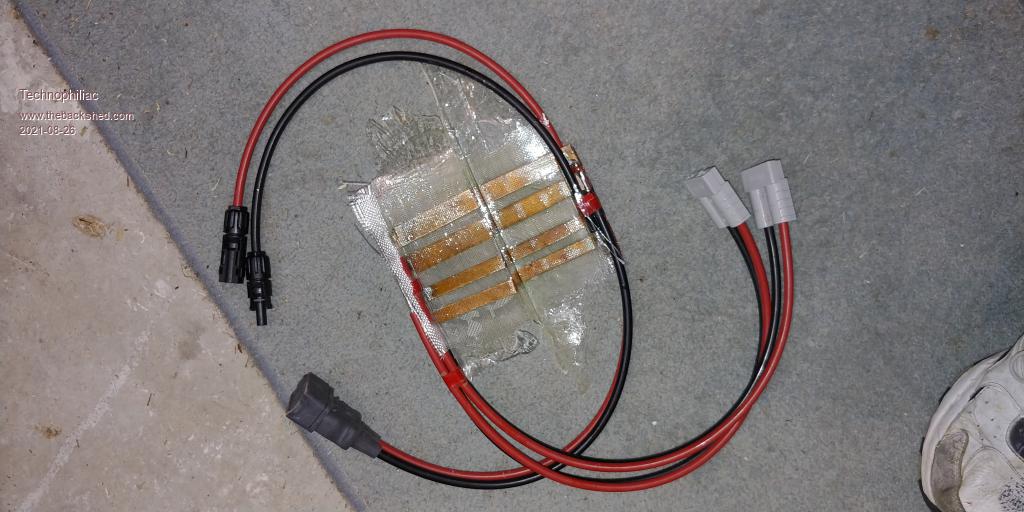 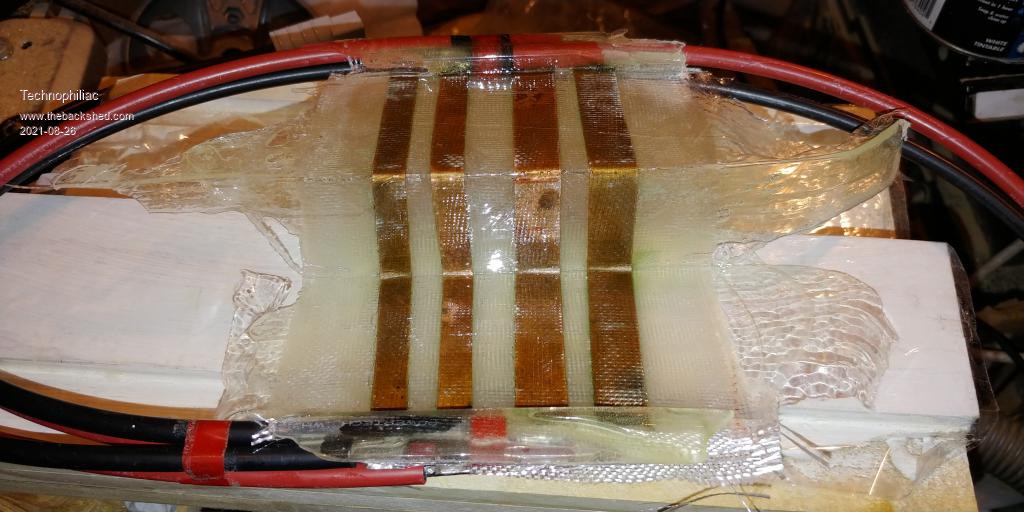 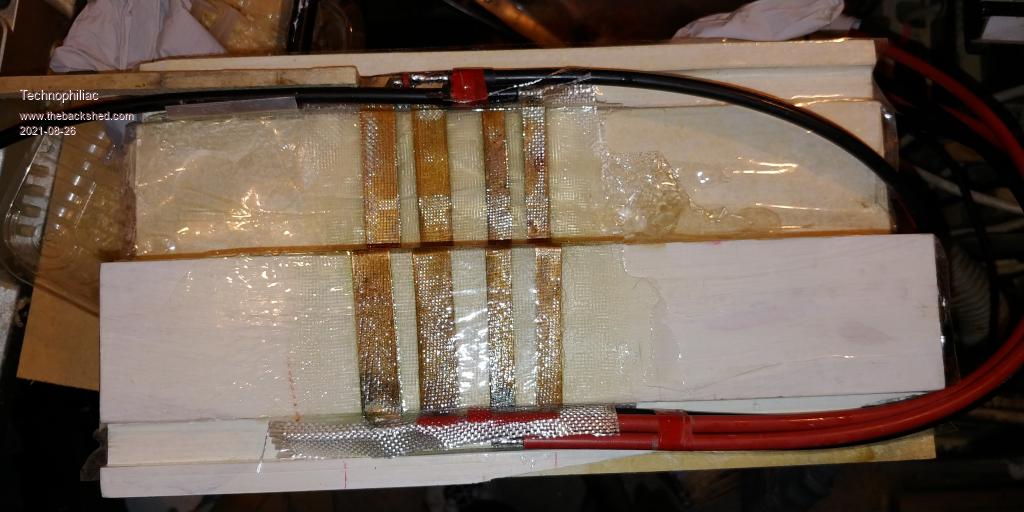 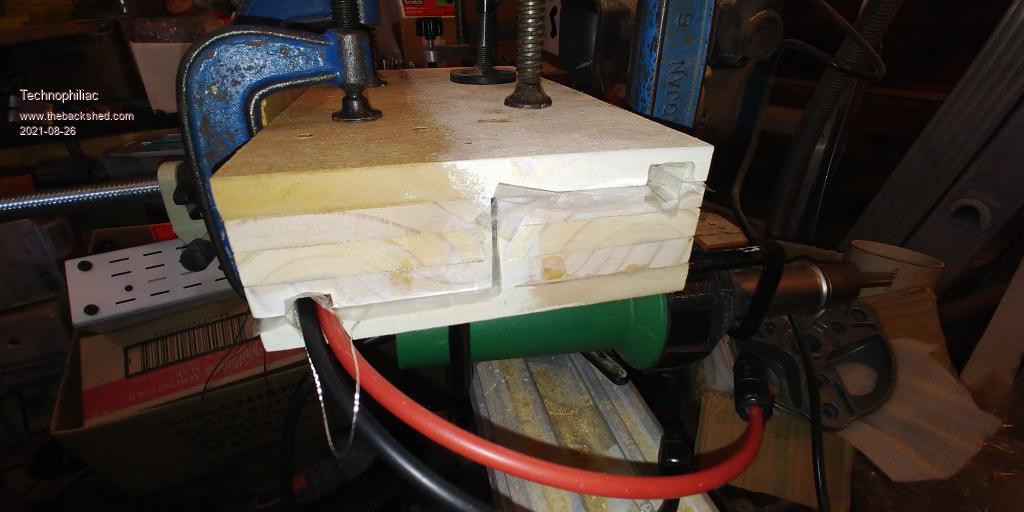 Davo, Wellington. You can have it perfect, on time, and at the best price. Choose any two. |
||||
| Technophiliac Regular Member Joined: 18/12/2020 Location: New ZealandPosts: 92 |
Painted as suggested and installed into a low traffic area on a private balcony: 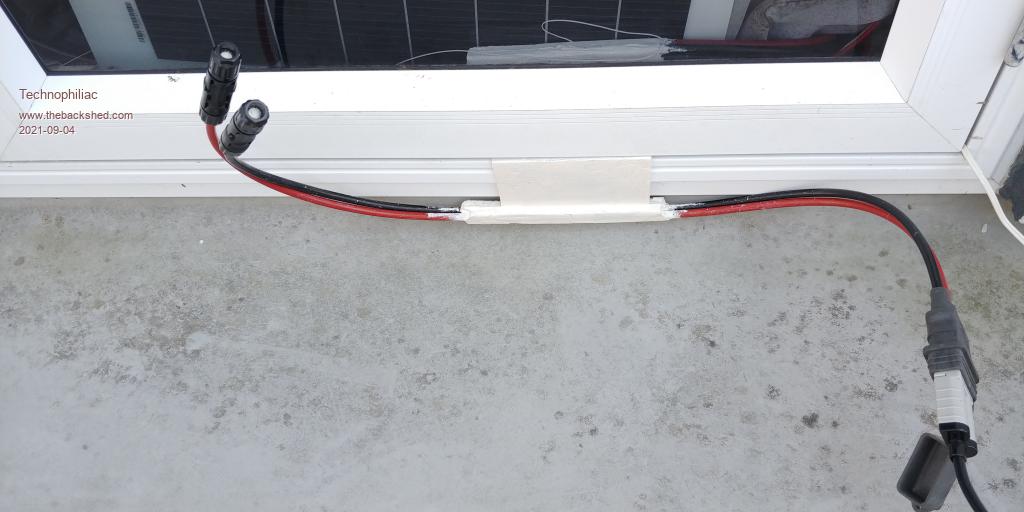 Davo, Wellington. You can have it perfect, on time, and at the best price. Choose any two. |
||||